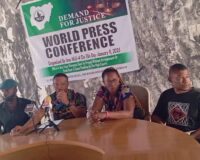Federation Account Allocation Committee (FAAC) says the Central Bank of Nigeria (CBN) has disregarded its invitations to answer questions on revenues moved to the federation account between January 2006 and December 2021.
This was disclosed by FAAC’s post mortem sub-committee (PMSC) at its monthly meeting on Tuesday, January 17, 2023.
The sub-committee was providing an update on a proposed review of the FGN/CBN treasury crude account No: 20054141287, according a document obtained by TheCable.
At the last FAAC plenary meeting held on November 18, 2022; a consultant engaged by the Nigeria Governors’ Forum (NGF), had made a presentation to ascertain whether all revenues generated by ministries, department, and agencies (MDAs) and paid into a designated account with the CBN during the aforementioned period; were fully moved to the federation account for distribution to the federating units as provided by section 162 of the Constitution of the Federal Republic of Nigeria (as amended).
The matter was later referred to the FAAC sub-committee with a mandate to review and report back.
Consequently, the PMSC said an ad hoc committee was constituted to handle the assignment.
It noted that all the members of the ad hoc committee attended the inaugural meeting scheduled for Thursday, December 8, 2022, except CBN which turned down the invitation, stating that “the bank is not answerable to FAAC post mortem sub-committee but the Revenue Mobilisation Allocation and Fiscal Commission (RMAFC)”.
“Therefore, another letter signed by the chairman of RMAFC requesting the bank to send appropriate representatives to the meetings of the ad hoc committee to enable the sub-committee proceed with the assignment was sent, but CBN did not respond,” the sub-committee said.
“The ad hoc committee called for another meeting on Thursday, 12th January, 2022, and a letter of invitation, signed by the chairman of RMAFC was sent to CBN, yet they did not attend.”
“The sub-committee has gone to this length to ensure that CBN attends the meeting because they are critical to the issue, without their participation the assignment would not proceed.”







